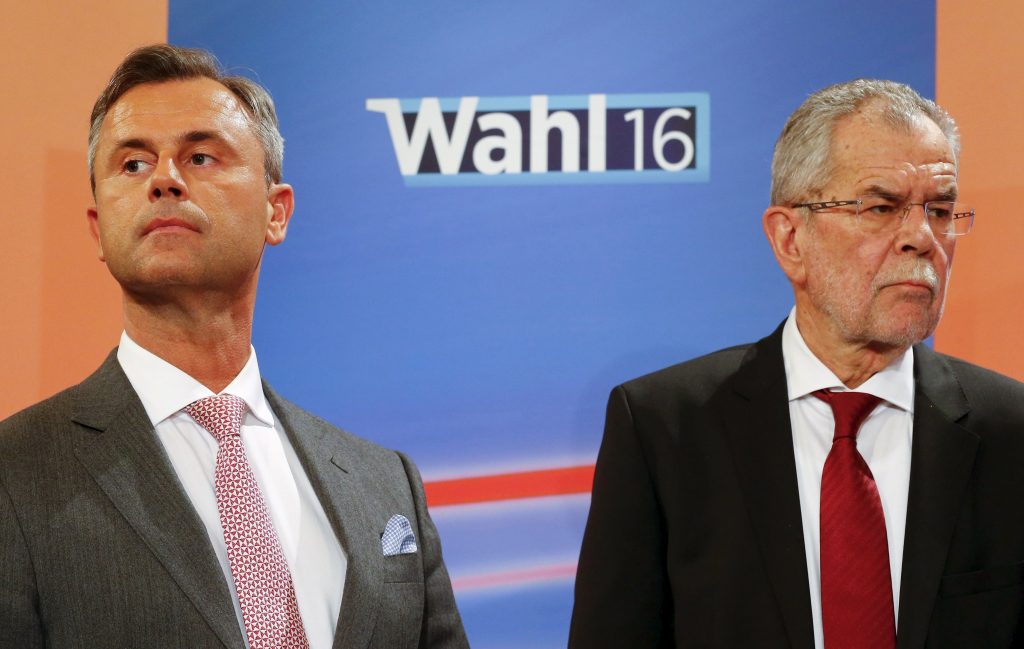Heinz-Peter Bader/Reuters
By
Sylvia Petter
I’m Australian, I was born in Austria, but can’t vote here. Austria, unlike most Western democracies, does not allow dual nationality, unless of course you’re a Russian opera singer who can’t speak German and only wanted the additional Austrian passport to make travelling easier, or you invest pots of gold and have somehow facilitated some deal in the interests of the country. And those interests depend on who is in charge. So for the time being, I may not be able to vote, but I can still share what I think.
Back when I lived in Vienna in the late 60s/early 70s, Sonnenkönig Kreisky ruled the waves of the Danube and a little bit beyond. A Jew, he stood up to Golda Meir saying he was Austrian first, and so met with Arafat in the interests of the country. I’d wear a Dirndl to work at American Express in Vienna and to go out at night. It was a practical dress that got you through every occasion. Oh, and on cool days I’d wear a scarf knotted at my throat with a sort of Kim Novak look to it.
A bit later former UN Secretary-General Waldheim became President of Austria and criticisms rolled in. Not because he broke a UN rule against family members also being employed there (his daughter was already a fixture in Geneva), but because his horse was a Nazi (Interestingly, the US knew about the horse when Waldheim was elected Secretary-General of the United Nations, but then the US has always had a finger in any pie.) Of course, the Austrians stuck in their heels for their man, despite candlelight vigils by those who remembered, but may not have passed any intimation of having done so on to their children – this was big for the losers after the war – and those too young to know but who in their gut felt something amiss. (There are periods in any country’s history where things are swept under a carpet never destined to be dry-cleaned).
Later, Wolfgang Schüssel of the bowtie betrayal – I call it that because as soon as he became Chancellor he sported a narrow tie reflecting to my mind a thinking that had become more and more narrow – did deals with the Southern RightWing leading to ongoing court cases against SunnyBoy Swarovskihubby (an epithet relating to his marriage into the Swarovski family and his Dorian Gray mien and Lion King coif) and ex Finance Minister of the Freedom Party, K-H Grasser, and the almost bankruptcy of Jörg Haider‘s Carinthia.
I moved from Geneva back to Vienna in 2006. In 2010, H-C Strache, leader of the Freedom Party, was running for mayor of Vienna. At the time the son of Australian friends came to visit. He spoke no German, but on seeing the giant posters with the candidates for mayor, he picked out one face that was most appealing to him and which to him seemed the most honest, if politicians could be seen thus. It was Strache’s.
This has stayed with me and I have wondered about the growing appeal to the young of the Right-Wing party. And the young, who years before turned up their noses at the conservative Dirndl and the Sound of Music narrative of the Austrian Alps, now find it subverted to fit their taste as a wolf in sheep’s clothing waves his stick to the beat of Austrian folk music singer, Andreas Gabalier. Heimatmusik subverted for the disconsolate masses? Propaganda is a long process of discovery.
Vivienne Westwood used facets of the Dirndl in her designer couture work, and leather shorts and Knickerbocker, the Loden jackets and traditional costume design now also offer a look of “coolness” in the upmarket area. But the Dirndl and its associated garb has also taken on a tackier face than that of pure conservatism and has been subverted in a synthetic mass market way by the Right Wing. Or was it all just waiting to happen in a country that never searched its own soul about the deeds of the past when they all raised their arms to welcome the Führer in 1938. For years, one could trade in the name of neutrality, despite some seeing it as a reprimand. But it’s all history now. And history has become the stuff of video games.
Yes, there have been many refugees coming into Austria, and yes, many Austrians have been helping them. The results of the last election round showed that the refugee issue was seen as important in places where people had little contact with refugees. Fear of the “other”. The safety of tribe. These factors are cleverly manipulated in a country that is well off and where people are reasonably happy. Those who remember say they’ve never had it so good, despite the government being out of touch with its coalition squabbles and politicians playing with a new box of matches. If it’s not really about migrants, or the economy, what’s it about then? Are we just bored with the peace for which those before us have worked so hard? Is it a matter of darkness and light? Can’t see one without the other?
Yes, there are problems. They are in the workforce, education, health, R&D, all the areas where the government is not doing its job because politicians are more interested in their own careers and not in the people who through their taxes pay them to make the proper decisions. (This is happening in Australia, too. How close the two countries are in some areas.) So a scapegoat is needed. You can’t blame the invisible “they” who do this and that. You need a name. Few remember history, or admit it, and those who do are ridiculed as old fogeys. Some who do remember, though, act out their frustrations by channelling former xenophobia. Fertile soil for the rise of elements trading in lies and manipulation, holding out their hands for a new world order where the lowest common denominator is the control of the masses. Sound familiar? History bytes? Would that history would bite more.
The great tragedy is, both in Austria and in so many countries, that democracy is being dismantled achievement by achievement, and if any ethical vestiges remain they are the stuff of the “lesser evil” in a world where bad is now good and good is dying. The greater tragedy is what do we tell the children?
In Austria on 4 December, we will find out whether history is strong enough to show the way forward or if it will become subverted as the voices of witnesses are finally silenced in the duel between two contenders, neither of which has the stature of a president, Alexander Van der Bellen and Norbert Hofer.
Stay tuned for Ruminations on the Austrian Presidential Election – Part 2 – After



No Comments Yet!
You can be first to comment this post!